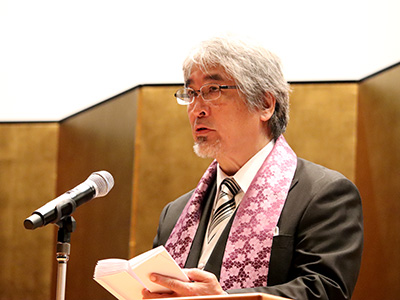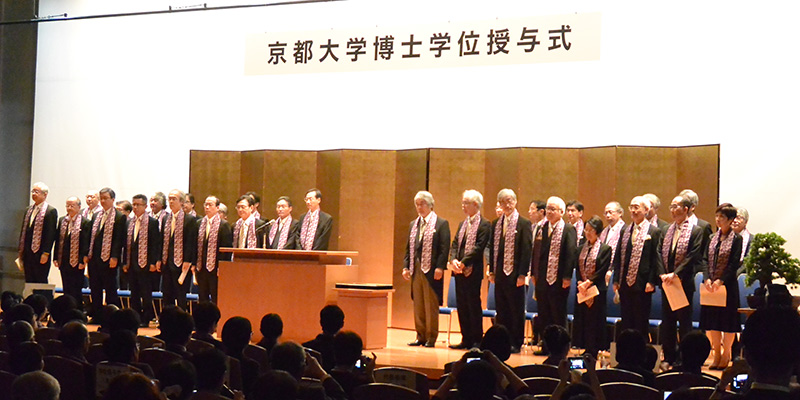Juichi Yamagiwa, 26th President

Today, Kyoto University is proud to award doctoral degrees to 187 students, 60 of whom hail from overseas.
On behalf of all of the faculty, staff, and executives joining us here today, including the Leading Graduate School Program coordinators, please allow me to express my sincere congratulations to all of you on your accomplishment.
Including the graduates gathered here today, Kyoto University has awarded 44,265 doctoral degrees to date.
Doctoral degrees at Kyoto University are granted in 22 different fields of specialization, such as the “Doctor of Letters”. Seven years ago, we began offering Leading Graduate School Programs, each of which awards a degree specific to the program.
I am impressed that you have all worked so hard to develop your knowledge and skills in your respective fields, learning from and inspiring one another.
The conferment of your degrees is both a destination that you have been working toward, and the point of departure for your future endeavors. I hope that the awards you receive today will be of great help to you as you progress in your careers.
Before I became a university president, I was a researcher studying gorillas in the tropical rainforests. These forests, commonly referred to as “jungles”, have the planet's greatest terrestrial biodiversity; their hot and humid environment is home to myriad species of plants and fungi, as well as an immense variety of wildlife, ranging from insects, reptiles, and amphibians, to birds and mammals. These organisms interact with each other in diverse ways, and continually give rise to new species.
When I assumed my current role as KyotoU President, it struck me that universities have much in common with jungles. Universities attract diverse knowledge from across the world, including much that is known to have shaped history and which is therefore subjected to analysis from a wide variety of perspectives. These institutions can therefore be regarded as storehouses of knowledge from across time and space, as well as places for creative endeavors utilizing that knowledge. What is important here is that, just as jungles continue to produce new species, universities constantly generate new ideas. All of you receiving doctorates today have been working at the forefront of this knowledge creation.
Receiving a doctoral degree means having your creative ideas officially recognized, and now, as qualified researchers, you are standing at the edge of an unknown world that is waiting to be explored. This applies to those of you entering the workforce, just as it does to those of you continuing your research at a university. This is because whatever you do, you are bound to face unresolved issues one after another, which you must tackle making use of the knowledge and creativity you have honed at Kyoto University. And someday in the future, you may encounter a challenge so great that you decide to spend the rest of your life working on it.
In July of this year, the 5th Kyoto University-Inamori Foundation Joint Kyoto Prize Symposium was held in Tokyo under the theme of “Balancing between Construction and Destruction in Life”. The speakers were Dr Shinichi Fukuoka of Aoyama Gakuin University, Dr Kazutoshi Mori of Kyoto University, Dr Shigekazu Nagata of Osaka University, and Dr Yoshinori Osumi of the Tokyo Institute of Technology. One thing that made a particularly strong impression on me was that these researchers, while representing different fields of study and taking different approaches, were all investigating the nature of life.
Drs Osumi and Nagata earned their doctorates in science, while Dr Mori and Dr Fukuoka received theirs in pharmacy and agriculture, respectively. All of them, however, eventually became intrigued by the life sciences, and began studying cells' mysterious activities, many of which we are still struggling to comprehend. As a result, Dr Osumi discovered the mechanism of cell autophagy, which involves intracellular protein degradation. Dr Mori revealed the process of protein synthesis in the endoplasmic reticulum. Dr Nagata elucidated the mechanism of apoptosis, a form of programmed cell death. And Dr Fukuoka explained these never-ending processes of cellular decomposition and synthesis in terms of a “dynamic equilibrium”, in which entropy is constantly avoided in defiance of the second law of thermodynamics.
I was also impressed by the fact that those four scientists, even after making such groundbreaking discoveries, continued to see life as an inexplicable phenomenon, and have remained committed to understanding its many mysteries. Their passion and dedication deeply moved me, reminding me that genuine researchers are on a lifelong search for truth. We are now in an era when living organisms can be modified through genetic recombination and genome editing, and humans live side by side with artificial intelligence and robots. This will make it more important than ever to understand the true nature of life.
The current era is also characterized by great uncertainty. Thanks to advanced information and communication technologies, we are now able to easily access large amounts of information at any time and from anywhere. However, it is also becoming increasingly difficult to confirm the reliability of information. The past gets constantly reviewed and edited, and the evaluation of historical figures is constantly in flux.
There is today a concept known as “planetary boundaries”, which asserts that our planet has nine environmental thresholds that must be maintained in order to ensure human survival. It is said that several of these thresholds have already been crossed, but scientists are divided on the validity of the figures cited in this conclusion. Similarly, while most of the world agrees that global warming is the result of an increase in atmospheric carbon dioxide (CO 2 ) concentration, one prominent country argues, on the basis of different data, that the change is actually part of a natural planetary climate shift, seeking to justify withdrawal from the Paris Agreement.
Likewise in Japan, researchers have different opinions about which data should be used in studies of the standards required for earthquake and tsunami resistance, the level of vulnerability acceptable for nuclear power plants, and the health damage caused by radiation. These illustrate that even science and technology cannot ensure human safety and security.
We now live in the midst of an advanced information infrastructure, where so many things, from transportation and buildings to our food and water supplies, are digitized and connected to complex networks. If communication and power systems are damaged by a typhoon or earthquake, many of those things will immediately stop functioning. In Japan this year, we learned this fact the hard way as a result of several major natural disasters. The problem is that we all enjoy the benefits of complex information systems without understanding their mechanisms. When a system breaks down, not knowing how it works, we must endure the resulting inconvenience or difficulties until specialists restore order. And in some areas, such as nuclear power generation, we cannot even predict how much damage will result from a system breakdown.
In the past, safe and secure environments were built by human hands, making them reparable by human hands in the event of damage. In contrast, in our increasingly artificial environment, damage tends to be more extensive than ever before, and can be irreparable with existing knowledge, potentially necessitating the development of new technologies. It seems that science and technology, which were invented by humans, are actually fueling our anxiety and insecurity. Now is the time for all researchers to join hands in an all-out, cross-disciplinary effort to chart a path to a safe and secure future.
Looking at the list of dissertations written by today’s graduates, I was struck by the diversity and depth of the research conducted, while also noting that many describe universal fundamental phenomena, which is typical of work coming out of Kyoto University. Among these studies, I also found many that reflected contemporary global trends, such as cross-cultural exchange associated with globalization, multicultural coexistence, movement of people and the distribution of goods, global-scale climate change and disasters, examination of existing laws and economic systems in light of rapidly changing social realities, and novel treatments for various diseases, including mental ailments.
The common thread running through all these works is that they offer sharp insights into unresolved or contemporary issues, and present new evidence or possible solutions based on thorough investigation and reliable evidence. I therefore find these to be dependable signposts for the future. I was also amazed and impressed by the diversity of the research undertaken; some works had such intriguing titles that I very much wanted to know what they were about, while others addressed highly technical topics that are beyond my understanding. I am certain that such diversity, creativity, and progressive thinking will eventually lead to important, world-changing ideas and innovation.
It is said that, in recent years, Japan’s research capability has been declining compared with other developed countries. This decline has been particularly notable in the area of cross-disciplinary collaboration, and the industrial sector is concerned about the lack of innovation coming out of the country. Kyoto University must dispel this negative mood and stay at the cutting edge of research. This will require all of you to demonstrate to the world the abilities you have developed as scholars. In order for a university to ensure that its discoveries are worth sharing with the world, it must provide a quiet academic environment where students can freely and diligently investigate any object or phenomenon that they find intriguing, and a community conducive to high-level dialogue and discussion that consolidates such findings into academic works. Kyoto University constantly strives to maintain the conditions necessary for such an environment.
I am sure that through your research endeavors at the University, all of you have become familiar with the joy of discovery and the trials of writing dissertations. Through interaction with your peers in your own and different fields, you have surely developed a unique style of thinking and your own distinctive worldview. Those are the qualities that Kyoto University, with its unique culture of academic freedom, develops in its researchers, and they will be a great asset to you throughout your lives. The theses that you wrote are tremendous gifts to future generations, and they will serve as signposts for coming generations of scholars. Their value will be largely determined by the extent to which you can maintain your integrity and literacy as researchers. In recent years, numerous incidents of scientific fraud have drawn harsh criticism from the general public. In the face of such incidents your integrity and experience as Kyoto University researchers are all the more valuable, and I hope that you will stay connected to that heritage as you pursue brilliant careers.
Once again, let me offer my sincere congratulations to each and every one of you.


